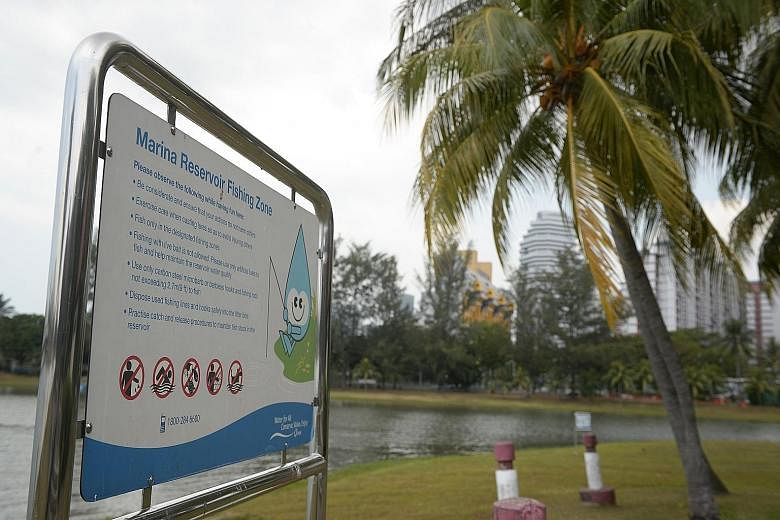There are fishermen's tales with an ugly twist - and many are surfacing after a wild otter pup was spotted last Saturday at the Kallang River with a fish hook near its eye.
The otter is the latest victim of irresponsible, and sometimes illegal, fishing activity that has left legitimate anglers fuming.
To start with, whoever injured the otter was not supposed to be fishing in that part of the river. The person also used a baited hook, which is not allowed in inland fishing as it could affect water quality.
Irresponsible anglers also litter and leave fishing lines and hooks in places where they pose a danger to humans and wildlife alike, fishing enthusiasts and environmental groups told The Straits Times.
"Irresponsible fishing habits still persist and, overall, the situation hasn't improved since Marina Barrage was built," said Mr Eugene Heng, founder and chairman of the Waterways Watch Society.
-
COMMON IRRESPONSIBLE FISHING PRACTICES
-
DISCARDING UNWANTED FISH ON WATERSIDE PAVEMENTS: Instead of throwing unwanted fish back into the water, irresponsible anglers sometimes leave the fish - usually smaller ones - on waterside pavements. The carcasses decompose, giving off a foul smell and attracting rodents. Anglers often give the excuse that the fish will feed stray cats. "But this is wrong and should not be done," says Mr Eugene Heng, founder and chairman of environmental group Waterways Watch Society.
LITTERING: This is a problem not just among anglers, but also other park users. When trash such as plastic bags enter water bodies, they endanger marine life which may consume the rubbish.
LEAVING FISHING LINES AND HOOKS LYING AROUND: These pose a danger to humans and animals alike. Lead hooks left in the water may also result in poisoning, says wildlife consultant Subaraj Rajathurai.
Audrey Tan
Volunteers from the environmental group patrol Singapore's reservoirs and canals, often finding evidence of irresponsible behaviour.
When anglers cut away entangled fishing lines with hooks and leave them in the water, kayakers and dragon boaters can be hurt. There is also a risk of harming wildlife and the latest case of the injured otter was the third since last October.
Last year, national water agency PUB issued about 400 summonses for illegal fishing.
An average of 500 were issued in 2014 and also in 2013 - double the 250 yearly average in 2011 and 2012. Fishing is allowed at designated spots in 10 out of the 17 local reservoirs, namely Bedok, Jurong Lake, Kranji, Lower Peirce, Lower Seletar, MacRitchie, Marina, Pandan, Serangoon and Upper Seletar.
"Fishing is not allowed in all waterways except at Pang Sua Canal, where there is a designated fishing deck," added a PUB spokesman.
Those caught fishing in no-fishing areas can be fined up to $3,000.
Undergraduate and avid angler Toh Kiat Sheng, 22, said there are several influential fishing communities, such as FishingKaki.com and Eat Sleep Fish. They all frown upon irresponsible anglers who give the community a bad name.
"We even have 'policemen' in the group who photograph irresponsible anglers who leave their trash behind, and post them (the photos) online to deter others from doing the same.
"The otter-hooking incident is unfortunate, but we should keep in mind that such instances are caused by black sheep who give all of us a bad reputation."
Mr Luke Gino Cunico, owner of the Fishing Kaki online forum which has 450,000 members, said the otter in last Saturday's case was injured by a baited hook, which is not allowed when fishing inland.
"The community is not happy. We are very strict about fishing etiquette and the type of hooks we use, we use artificial lures and barbless hooks," he said.
Veterinary surgeon and angler Jean-Paul Ly said those who fish should not leave lines and hooks lying around as they could be picked up by animals.
"Although hooks are small and could be passed out by the animal, there is a risk they could get lodged in their internal organs," said Dr Ly, a consultant at the Animal Recovery Centre in Serangoon Road.
He also cautioned against pulling on the line if an animal is hooked as this may cause the hook to set.
Rescue efforts may distress otters, which are social animals, said Mr N Sivasothi, senior lecturer at the National University of Singapore's department of biological sciences. "A family group of otters will not tolerate capture, and trying to rescue one individual may cause them a lot of distress and disruption."
Meanwhile, the injured otter pup was seen with its family near the Kallang Wave Mall yesterday morning. It is not known if the hook is still lodged near its eye.
Last October, a man was caught on video hooking an otter while fishing illegally. In response to queries, the Agri-Food and Veterinary Authority (AVA) yesterday said there was "insufficient evidence to prove that the angler had intentionally hooked the otter".
A spokesman said: "AVA did not take any enforcement action against the angler. PUB has issued a fine to the angler... as he was fishing in a no-fishing area."



